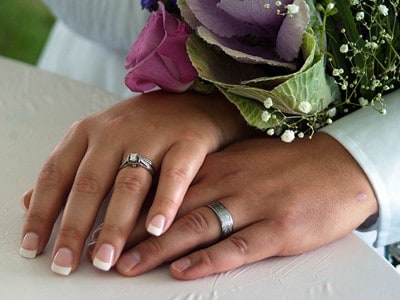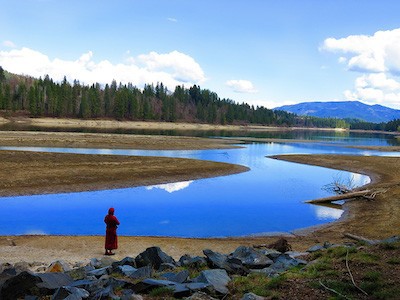A Buddhist marriage blessing

Venerable Thubten Chodron was asked by a couple in the USA to lead a marriage blessing (this is different from a marriage ceremony, which monastics are not allowed to perform) and prepared the following. Others may use or borrow from it according to their needs.
Do the Seven Limb Prayer from The King of Prayers or the Chenrezig practice, and then lead people in a meditation on loving-kindness. Then the partners say to each other and to their friends and family:
We are happy today not only because we can share the joy of our love for each other with friends and family, but also because we have the opportunity to voice our aspirations for the future.
We aspire to make our spiritual path the core of our life together. We will help each other on the path to enlightenment, watering the seeds of love, compassion, generosity, ethics, patience, joyous effort, concentration and wisdom in each other. As we age and undergo the various ups and downs of cyclic existence, we aspire to transform them into the path of love, compassion, joy and equanimity.
We recognize that external conditions in life will not always be smooth, and that internally our own minds and emotions sometimes get stuck in negative ways of thinking. When this happens, we aspire to see all these circumstances as a challenge to help us grow, to open our hearts, to accept ourselves, others and life itself; and to generate compassion for all others who are also unhappy or suffering at that moment. We aspire to avoid becoming narrow, closed or opinionated, and will help each other see all the various sides of a situation and to bring acceptance, flexibility and equanimity to it.
We aspire to continuously remember our own Buddha nature, that of each other, as well as the Buddha nature of all living beings. In this way, we will always be aware that there is hope, that all of us can eventually arrive at a state of lasting happiness, and that whatever misfortunes occur are temporary.
We recognize that just as we are a mystery to ourselves, the other person is also a mystery to us. We aspire to understand ourselves, each other, and all living beings, and to regard all the mysteries of life with curiosity and joy.
We aspire to preserve and enrich our affection for each other, and as it does, to share it with all beings. We will take the feelings we have for each other of care, consideration, affection for each other, and our vision of each other’s potential and inner beauty as an example and will try to open our hearts to feel this way impartially for all beings. Rather than spiraling inwards due to our love for each other, we aspire to radiate this love outwards to all beings. We will examine our own minds and continually discuss with each other so that this vision remains alive in our hearts.
When it comes time to part, be it through death or another fluctuation of cyclic existence, we aspire to look back at our time together with joy—joy that we met and shared what we did—and acceptance that we cannot hold on to each other forever. We will wish each other well from the depths of our hearts and help each other as we both go on to new lives.
We aspire to remember the disadvantages of ignorance, anger and clinging attachment and to apply Dharma antidotes when these arise in our minds and to help each other do so also. We aspire to remember that we are deeply connected with all living beings, and that all of them have been kind to us in this and previous lives. We aspire to become fully enlightened in order to benefit them most effectively, with all of our compassion, wisdom and skill. We aspire to develop the wisdom understanding the relative functioning nature of things and the wisdom knowing their deeper way of existence—that they are empty of inherent existence. Day to day, as we progress along the path, we aspire to be patient with ourselves and others, knowing that change comes slowly and gradually, and that our inner resources and the help of the Buddhas and bodhisattvas are always accessible to us.
Venerable Thubten Chodron
Venerable Chodron emphasizes the practical application of Buddha’s teachings in our daily lives and is especially skilled at explaining them in ways easily understood and practiced by Westerners. She is well known for her warm, humorous, and lucid teachings. She was ordained as a Buddhist nun in 1977 by Kyabje Ling Rinpoche in Dharamsala, India, and in 1986 she received bhikshuni (full) ordination in Taiwan. Read her full bio.


